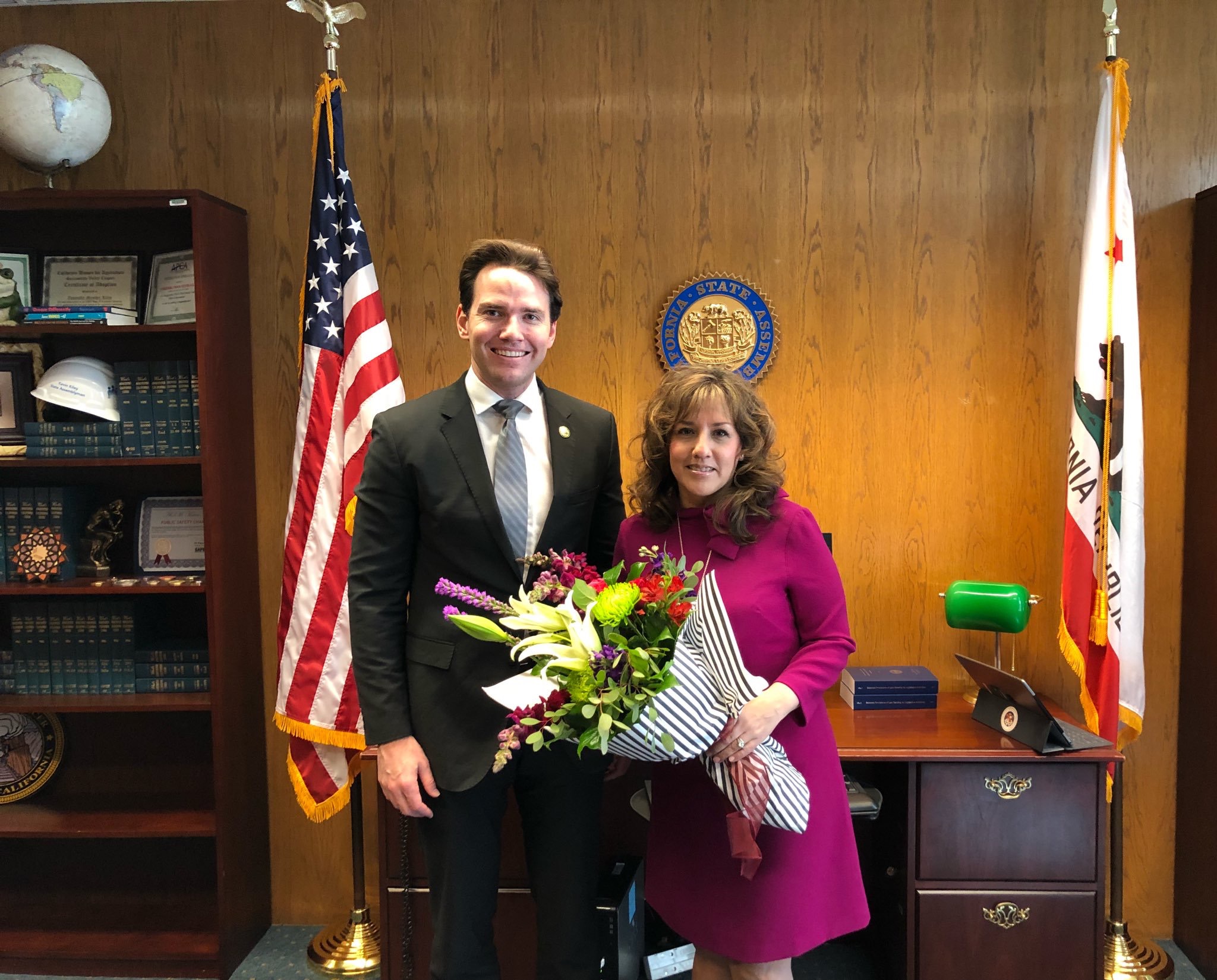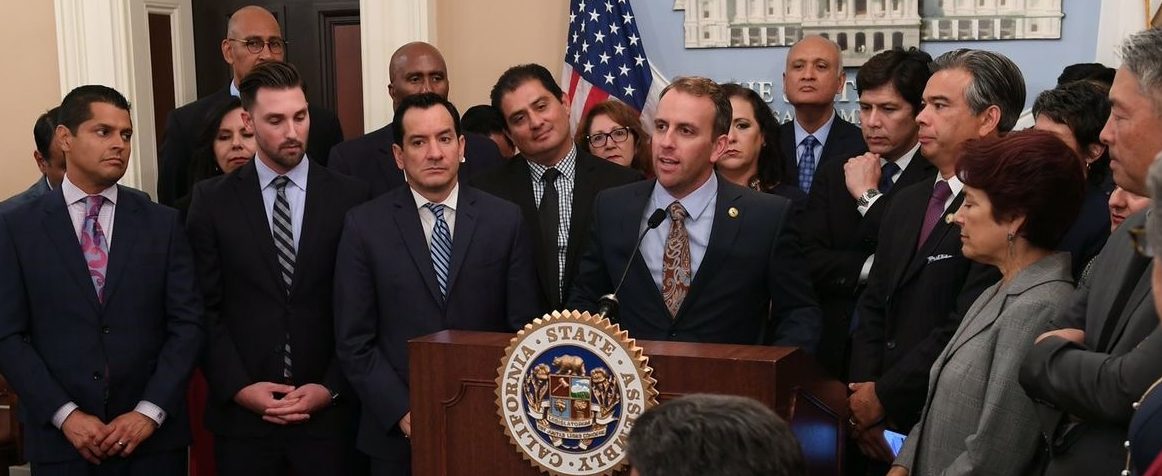
Assemblyman Isaac Bryan. (Photo: a55.asmdc.org)
Assemblyman Isaac Bryan’s Assault on Working Families
Bryan is also sponsoring a bill to gut California’s 112-year-old initiative and referendum process so voters no longer have veto power over California’s Democrat-controlled legislature
By Edward Ring, April 17, 2023 2:17 pm
It isn’t hard to figure out who controls everything Assemblyman Isaac Bryan does in the California State Legislature. In the November 2022 election, every single one of the first 29 of his biggest donors were unions, almost all of them public sector unions, according to campaign finance reports. No other special interest even came close.
Purchasing Bryan’s political agency comes fairly cheap, as does his willingness to ignore the interests of working families in California: the Democrat occupies one of the safest seats in the state, enjoying a registration advantage of 66 percent Democrat versus just 8 percent Republican in his Los Angeles area district.
How is Assemblyman Bryan (D-Los Angeles) destroying the aspirations of working families in California?
By adhering to junk science, promulgated by the billionaire-fueled “renewables” lobby and abetted by institutions filled with cowards who dare not touch the third rail of California politics – the “climate emergency.” Phony, futile but draconian measures to mitigate this concocted crisis are the main reason everything is unaffordable in California.
Bryan’s latest misanthropic blunder bent on destroying California’s working class is to oppose the referendum to repeal SB 1137, which will kill California’s oil and gas industry.
Senate Bill 1137 was introduced by former state senator turned California Labor Federation leader Lorena Gonzalez, and signed by Governor Newsom in September 2022. If it takes effect, it will ban new oil and gas wells within 3,200 feet of any “sensitive receptor,” defined as any residence, educational establishment, health facility, prison, business open to the public, and much more.
Basically, anywhere.
For existing oil and gas wells, SB 1137 will add a new layer of compliance to be met, despite California’s oil and gas industry already operating under the most comprehensive environmental standards in the world, including the California Environmental Quality Act, rules for air quality management districts, and a huge body of law the industry is already satisfying.
SB 1137 is not going to help the environment. To illustrate how pointless the law is, consider the oil wells in Baldwin Hills, a part of Los Angeles that overlaps with Bryan’s district. These wells produce almost no pollution. They are equipped with vapor locks and strictly regulated. On the other hand, one of the largest sources of air pollution in Los Angeles is from ships transporting goods into the ports of Los Angeles and Long Beach. These ships burn bunker fuel, the dirtiest, cheapest fuel. These ships spew unfiltered filth into the air offshore and it blows straight into the Los Angeles Basin.
And here’s an inconvenient truth for Assemblyman Bryan: For every well that is shut down instead of upgraded in Baldwin Hills, more bunker fuel guzzling, unhealthy emissions belching tankers have to anchor offshore, delivering to California’s refineries oil sourced from some of the most despotic, despoiled places in the world.
No matter how much Gov. Gavin Newsom denies it for political gain, the reality is that fossil fuel still delivers over 70 percent of the total energy Californians use. The timetable California’s legislature has imposed for replacing fossil fuel will make energy something only the rich can afford. And when energy is unaffordable, everything becomes unaffordable.
That’s why a referendum to repeal SB 1137 is headed for California’s November 2024 ballot: to allow voters to decide whether or not to turn California into a state where only rich people can afford to live.
Bryan’s Retaliatory Attack on Direct Democracy
Assemblyman Bryan is opposing the referendum to repeal SB 1137, but that’s not all: He is also sponsoring Assembly Bill 421, designed to gut California’s 112-year-old initiative and referendum process so that voters no longer have veto power over California’s Democrat-controlled legislature.
The power of citizens to enact legislation or repeal legislation is one of the only remaining liberties where California sets a good example for other states. It acts as a much-needed check – the only check – on the state’s one-party-ruled legislature — and Democrats and the unions that fund their political campaigns don’t like that. They want to raise the bar to make it next to impossible for anybody except for California’s unions to get any measure on the ballot.
Already the process to qualify referendums, recalls or initiatives for the state ballot is an expensive and difficult process. Proponents must circulate petitions and gather hundreds of thousands of signatures from registered voters. It is an extremely difficult undertaking, with no guarantee that once the measure qualifies for the ballot, voters will approve it. Any group attempting to qualify initiatives must find partners in industry or wealthy donors to have any chance of success.
California’s unions have more than a leg up when it comes to qualifying an initiative for the ballot. In addition to the hundreds of millions of dollars in their political war chest, they have access to tens of thousands of organized union workers to circulate and sign petitions.
Bryan’s perfidy towards ordinary Californians has all the hallmarks of the special interests he claims he’s fighting against. It stacks the cards even further against citizen legislation, even while carving out loopholes for unions. Here are highlights:
1 – Require paid signature gatherers to register with and receive training from the state. Inevitably, this will severely limit the number of available signature gatherers. For signatures to count, every signed petition must include the circulator’s unique registration number.
2 – Would reduce from 180 days to 90 days the time allowable to gather signatures on petitions if the initiative measure proposes to repeal or amend, either directly or indirectly, a statute or portion of a statute enacted by the state legislature within the last two years.
3 – Require 10 percent of signatures to be obtained by volunteers rather than paid signature gatherers, unless the circulators are members of a union.
4 – Petitions circulated by volunteers must have, in bold, printed notification that a volunteer is circulating the petition, whereas petitions circulated by a person who is getting paid require a different notice, disclosing that a paid circulator is working. This creates a need for proponents to print and distribute at least two versions of the petitions. This adds expense, creates potential for errors, and introduces ambiguity – what if the petition is included in a direct mail appeal?
5 – Every petition must have a unique number to “facilitate administrative efficiency.” The practical impact of this is to eliminate the threat of a campaign whereby voters could download and print initiative petitions, and force centralized printing and shipping of petitions.
6 – Requires an “official top funders” sheet to accompany petitions, requiring anyone signing a petition to fill out an acknowledgement that they have read the funding disclosure. This and the other requirements make it much more likely some technicality will be violated, invalidating a higher percentage of signed petitions.
Isaac Bryan’s AB 421 is a Threat to Democracy
For those of us who still believe California’s voters might be willing to terminate some of the policies that are destroying their lives and livelihoods, the opportunity to fight to qualify a ballot initiative is our last hope in this machine ruled one-party state. Assemblyman Bryan’s AB 421 represents in a most personal way the “threat to democracy” that he and his Democrat colleagues obsessively warn us about.
Why Bryan and his public sector union donors are complicit in policies designed to make it impossible for California households to afford their essentials isn’t hard to figure out. As the viability of the private sector is taken away, the role of the public sector grows. That’s more public sector union members, more dues, more power. That they’ll eventually kill the host and we’ll all end up like the Venezuelans is an insight that eludes these apparatchiks.
The powerful State Building and Construction Trades Council, mostly representing private sector workers, has joined with the oil and gas industry to support the referendum. Their welcome break from the pack offers a reality check to Assemblyman Bryan, at the same time as it offers the merest glimmer of hope to the rest of us. Maybe the SBCTC will further prioritize demanding sensible energy, water, and infrastructure projects and policies in California. It could make a difference.
Isaac Bryan: You are not standing for the working people in California. You are reciting shibboleths, fed to you by donors who are bent on dismantling the foundations of our prosperity.
- Ringside: What Will California Gas Prices Do in 2026? - February 19, 2026
- Ringside: Large Scale Desalination Belongs in California’s Water Strategy - February 12, 2026
- Governor Newsom: Turn Up the Delta Pumps! - February 11, 2026





Thank you very much for letting us know about this outrage, Edward Ring.
Will be contacting my state assemblyman and senator to register my strong opposition to AB 421.
As for Asm Isaac Bryan’s opposition to the Dump SB 1137 referendum, possibly one way to register OUR opposition what he is doing is to call his Sacramento office after hours and leave a message if that set-up is available. Or maybe send a snail mail letter or postcard. Otherwise apparently we aren’t allowed to weigh in with his office (or any other rep but our own) if we are not in the district and thus have the right zip code —— even though what he is doing has the potential to affect ALL Californians. Am I missing something?
Contact Assembly Member Isaac Bryan
Capitol Office, 1021 O Street, Suite 5630
P.O. Box 942849-0055; (916) 319-2055
District Office
5601 West Slauson Avenue, Suite 200, Culver City CA 90230; (310) 641-5410
Even if this passes, good chance that people will repeal it via the referendum process anyway which would be highly ironic. Time and time again it has been shown that state legislatures are wildly out of touch with the people they supposedly represent. Even CA’s “progressive” voters find their over reach to be excessive. Of course, much of this could be avoided if the people voting actually stopped to do a little research on the people they are voting for other than just looking for the the one with the (D) next to their name. But I guess that is too much to ask for…